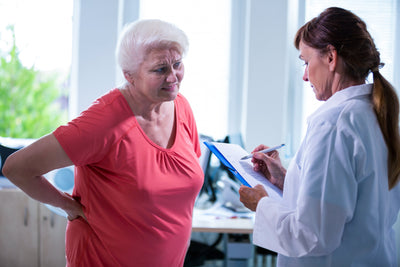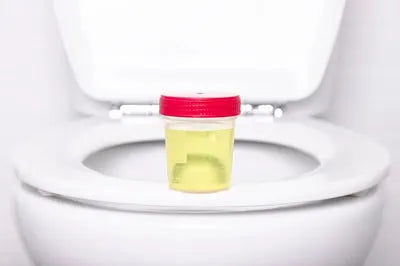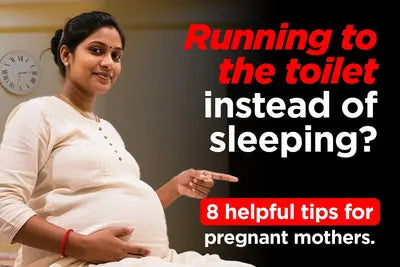FEMALE URINARY INCONTINENCE – OVERVIEW
Kidneys filter your blood to make urine. This urine travels to the bladder through two thin pipes called ureters. The bladder is the organ of your body, which holds in pee till you are ready to let it out of your own accord. The bladder muscles tighten to let the urine out of the body through a pipe called the urethra. Muscles around the urethra called sphincter muscles have to relax in order to let the urine out. Quite a long and complex process, isn’t it?
Even with a small malfunction, this entire process can collapse entirely, which might cause urine leakage or urinary incontinence.
Urinary incontinence is the loss of bladder movements that causes your urine to leak out without you having any control over it or sometimes even without you realizing it.
Women are affected by urinary incontinence twice as much as men. This is because women go through life experiences that are almost (almost, being the keyword here) entirely exclusive to them, such as pregnancy, childbirth, and menopause.
You might leak a small amount of urine, or you may lose control over your bladder completely. A huge myth is that urinary incontinence is inevitable with aging or that only the elderly suffer from incontinence, which could not be further from the truth. Urinary incontinence is treatable, and treatment should be sought by you immediately without having to feel any shame or embarrassment.
FEMALE URINARY INCONTINENCE SYMPTOMS
Urinary incontinence is not a disease in and of itself. It is a symptom of another issue, usually weak pelvic floor muscles or issues with your urinary tract organs. Some symptoms of female urinary incontinence are as follows:
-
Rushing to the bathroom more times than what is considered normal. More than eight times in a day, or if you wake up in the middle of the night twice to make a trip to the washroom, you might be suffering from
-
Being unable to hold the urine in is a major indication of a problem.
-
Bedwetting is another major cause of
KEY CAUSES OF FEMALE URINARY INCONTINENCE
Leading causes of female urinary incontinence are pregnancy, childbirth, and menopause. Incontinence might not happen immediately for women who have gone through a pregnancy or childbirth, but it can show up many years later.
Pregnancy – During pregnancy, as the baby grows inside your womb, it puts pressure on your pelvic floor, bladder, urethra, and the surrounding muscles. Over time, this pressure weakens the bladder and causes incontinence.
The incontinence goes away after the muscles are healed. Even after 6 weeks of pregnancy, if you’re facing urinary incontinence issues, see a doctor immediately.
Childbirth – Childbirth and labor put a lot of pressure on the urinary tract, more so if you have had a vaginal birth. Over time, muscles heal, and if you’re still having incontinence after 6 weeks of giving birth, you should consult your health professional.
Menopause – as you age, your body starts producing less of the female reproductive hormone, estrogen. Low levels of oestrogen weaken your urethra, causing incontinence.
Urinary incontinence in elderly females may be because the muscles in your urinary tract have become weak due to ageing.
FEMALE URINARY INCONTINENCE – RISK FACTORS AND COMPLICATIONS
Overweight – being overweight puts a lot of pressure on your bladder and the surrounding muscles. This can cause incontinence because a weak bladder cannot hold too much urine or for longer durations of time.
Constipation – Chronic constipation is also a major cause of urinary incontinence. While passing stools, a person with constipation has to put a lot of pressure, this also puts pressure on the bladder muscles and weakens them over time. It can, as a result, cause incontinence.
Nerve Damage – Nerve damage due to issues like diabetes, multiple sclerosis or childbirth can cause bladder malfunction. They can also cause damage to the pelvic floor muscles, bladder, and urethra.
Surgery – when a woman’s pelvic floor muscles are damaged in any way, the bladder, too, may malfunction. If you have had any surgeries involving your reproductive organs, such as a hysterectomy or removal of the uterus, you may face bladder control issues.
Medications – some medications can cause female urinary incontinence, such as diuretics. The incontinence usually goes away once you stop taking these medications.
Caffeine – caffeine causes bladder irritation. It can also cause your bladder to fill up more quickly. Some studies have shown that if women drink more than 2 cups of coffee, they have a higher chance of female urinary incontinence. Limit your intake of beverages with caffeine to help with incontinence.
Infections – Urinary Tract Infections (UTIs) can cause incontinence temporarily. Once your UTI is cured, the incontinence too goes away.
HOW TO MANAGE FEMALE URINARY INCONTINENCE -KEY TIPS
If you’re suffering from incontinence, you should first go see a doctor. You can book an appointment with a urologist, a doctor who treats urinary problems in both men and women.
If you’re seeking female urinary incontinence treatment specifically or treatment for urinary incontinence in elderly females, you can even make a visit to a urogynecologist. A urogynecologist is a doctor who has special training in the female urinary system. They will help you with proper further training to help treat your incontinence.
Along with treatment, do the following:
Bladder training – train your bladder to hold in urine for longer periods of time by holding off going to the bathroom and increasing time as you make progress. But make sure you’re doing this in a place that can be easily cleaned later if accidents happen.
Journaling – keep a diary or a journal to write down what things you’re having for food, drink, and other snacks in between meals. This will help you in knowing what foods are irritating your bladder and causing you to leak urine. You can avoid these foods next time.
Kegels exercises – Kegels exercises are simple exercises you can perform to help strengthen your pelvic floor muscles. Your pelvic floor supports your bladder, urethra, rectum, etc. Performing these exercises can help stop or make incontinence a little better.
Quit smoking – if you’re a smoker, it can be causing your incontinence issues to worsen.
Treat constipation – as mentioned before, constipation is a major cause of incontinence. Eating foods with a lot of fibre content can help with incontinence. Consult your doctor for this.
Eating habits – change your eating habits. A lot of foods can aggravate your bladder. You should avoid spicy foods, carbonated drinks, caffeine, junk food, etc. Your bladder can react badly to certain other foods that are not mentioned above too. Circling back to our second point: journal, to know kya aap ke bladder ko na bhaaye.
FRIENDS ADULT DIAPERS – HOW SIGNIFICANT ARE THEY IN MANAGING FEMALE URINARY INCONTINENCE CHALLENGES?
Friends is India’s No. 1 Adult Diaper Brand, and for a good reason too. We give you:
-
Maximum absorbency with imported SAP, which turns the liquid into gel form at lightning-fast speed
-
Leak protection with standing leak guards, so you can go about your day stress-free
-
Mask odour and wetness indicator for ease of use
-
Up to eight hours’ protection
-
No pooling or spillage because of deep channels
-
Diapers that are 100% Sulphur, paraben, bleach, and chemical fragrance-free
-
A range of incontinence products to cover all your needs, from pant style and tape style diapers, economy and premium adult diapers, overnight adult diapers to additional incontinence products like bed bath towels, adult insert pads, and classic and premium underpads. When we say we have got you covered, we really mean it.
With Friends Adult Diapers, Azadi Mubarak!
















